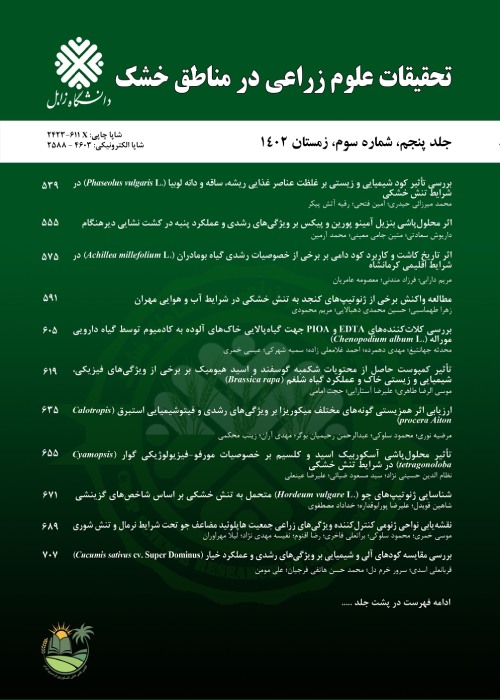The effect of drought stress during the reproductive stage on root growth of chickpea (Cicer arietinum L.) and determination of the traits influencing the yield
Author(s):
Article Type:
Research/Original Article (دارای رتبه معتبر)
Abstract:
Introduction
Drought is undoubtedly one of the most important environmental stresses reducing the yield of agricultural plants worldwide. Drought is also a significant yield-limiting factor in chickpea (Cicer arietinum L.) production. This crop's yield may be reduced by intermittent drought during the vegetative phase, reproductive development drought, or terminal drought at the end of the crop cycle. Drought stress may reduce photosynthesis, CO2 fixation, and chlorophyll content, or it may damage the photosynthetic apparatus.Materials and Methods
The current research has been conducted in greenhouse as pot experiment for the purpose of evaluating the effect of drought on the yield and its components, as well as to investigate the relationship between physiological traits and seed yield under drought stress. The treatments included four levels of drought stress (40%, 60%, 80%, and 100% of the water requirement) in a completely randomized block design with three replications.Results and Discussion
Drought stress influences the leaf weight, stem weight, seed number, seed weight, pod weight, root weight, root volume, root length, root surface, and longitudinal density of the root at a probability level of 1%; it was also found to have a significant effect on the number of pods at a probability level of 5%, but no significant effect on the ratio of root weight to stem weight. The highest leaf weight, stem weight, seed number, seed weight, pod weight, root weight, root volume, and root length were observed at 100% and 40% of the water requirement, respectively. The studied characteristics were found to be manifested less strongly as the percentage of water requirements decreased. Under drought stress conditions, seed weight and pod number were found to be reduced by 36% and 58%, respectively, in comparison to relatively severe stresses. Seed number was found to be negatively correlated with root weight and longitudinal density of the root (respectively -0.366 and -0.018) and positively correlated with root surface and root volume in the absence of drought stress (100% and 80% of the water requirement) (respectively 0.619 and 0.527). In contrast, the seed weight was positively associated with root-related traits under drought stress conditions (60% and 40% of the water requirement), with the greatest effects observed for root volume (0.739) and root length (0.657). In addition, a positive correlation was found between the number of seeds and root characteristics such as root weight (0.823), root surface (0.804), and root volume (0.594). In the absence of drought stress, the results of stepwise regression indicate that an increase in pod number, seed number, and leaf weight has a positive effect on yield. under drought stress, there was a significant increase in pod number, seed number, leaf weight, and root weight. Therefore, under conditions of drought stress, root mass is crucial, as it allows the plant to absorb more water.Conclusion
According to the findings of this study, drought stress reduced the yield of chickpeas by decreasing the weight of stems and leaves, the weight and volume of roots, and the number and weight of pods. By decreasing the plant's water demand from 100 to 40%, all of the studied characteristics were diminished with the exception of the root -to -stem ratio. Since the parameters of pod number, seed number, and leaf weight under both stress and non-stress conditions influence plant yield, it is important to measure these traits precisely. The results also demonstrated the significance of root mass under drought stress, because it is indispensable for water absorption.Keywords:
Language:
Persian
Published:
Journal of Crop Science Research in Arid Regions, Volume:4 Issue: 2, 2023
Pages:
459 to 473
https://magiran.com/p2553329
دانلود و مطالعه متن این مقاله با یکی از روشهای زیر امکان پذیر است:
اشتراک شخصی
با عضویت و پرداخت آنلاین حق اشتراک یکساله به مبلغ 1,390,000ريال میتوانید 70 عنوان مطلب دانلود کنید!
اشتراک سازمانی
به کتابخانه دانشگاه یا محل کار خود پیشنهاد کنید تا اشتراک سازمانی این پایگاه را برای دسترسی نامحدود همه کاربران به متن مطالب تهیه نمایند!
توجه!
- حق عضویت دریافتی صرف حمایت از نشریات عضو و نگهداری، تکمیل و توسعه مگیران میشود.
- پرداخت حق اشتراک و دانلود مقالات اجازه بازنشر آن در سایر رسانههای چاپی و دیجیتال را به کاربر نمیدهد.
In order to view content subscription is required
Personal subscription
Subscribe magiran.com for 70 € euros via PayPal and download 70 articles during a year.
Organization subscription
Please contact us to subscribe your university or library for unlimited access!



